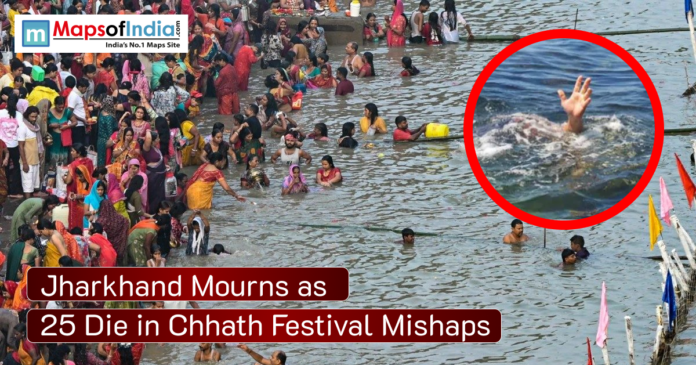The festival of devotion and thanksgiving turned into heartbreak in Jharkhand, with at least 25 persons, including some children, drowning in the process of conducting rituals during the Chhath festival. The events took place in several districts, putting the four-day festivity in a sad mood.
The drownings, as reported, occurred in the districts of Hazaribag, Garhwa, Simdega, and Palamu, among others. The majority of the victims died as they gave arghya – prayers to the setting or rising sun in rivers, ponds or other water bodies. Two 11 and 12-year-old girls who drowned in the pond in the Bela village of Hazaribag were engaged in the ritual. In a different tragic event, a 13-year-old boy died in the Danro River, Garhwa district. This sorrow was further compounded by the drowning of a two and a half year old girl in Simdega district in a bucket within her home.
In Hussainabad in the Palamu district, two worshippers drowned in the river Sone, and another one disappeared somewhere in the middle of the ritual bathing. Law enforcement has come out with rescue and search missions, and police and local divers are involved in body retrieval and support of families. The authorities have verified that various cases have been reported late, as the villagers tried to recover the victims themselves before calling the authorities.
The Chhath festival, a festival mostly observed in Bihar, Jharkhand, Uttar Pradesh, and some parts of Nepal, is a ritual in which the Sun God and his sister, Chhathi Maiya, are worshipped. Water is also a big concern as devotees spend long periods in water to make prayers during sunset and sunrise. But most of the outskirts do not have any specified ghats or safety provisions, making these accidents more likely.
Local governments have issued condolences and requested people to be more cautious in the rest of the rituals. Police crews have been deployed around the popular ghats, and attempts are being made to locate the vulnerable water bodies in order to avoid further accidents. The authorities are also examining the possibility of whether the appropriate safety precautions were observed at the impacted sites.
The pious and simple festival has taken away several families. What started as a religious festival of thankfulness and faith has turned out to be a failed hope, as it reminds both the authorities and the worshipers that they need to put more effort into ensuring that safety is enhanced when religious people come together in large numbers.
The tragedy itself, as Jharkhand is still performing rescue operations and inquiries, is a terrible lesson that devotion should never be taken at the expense of safety.










